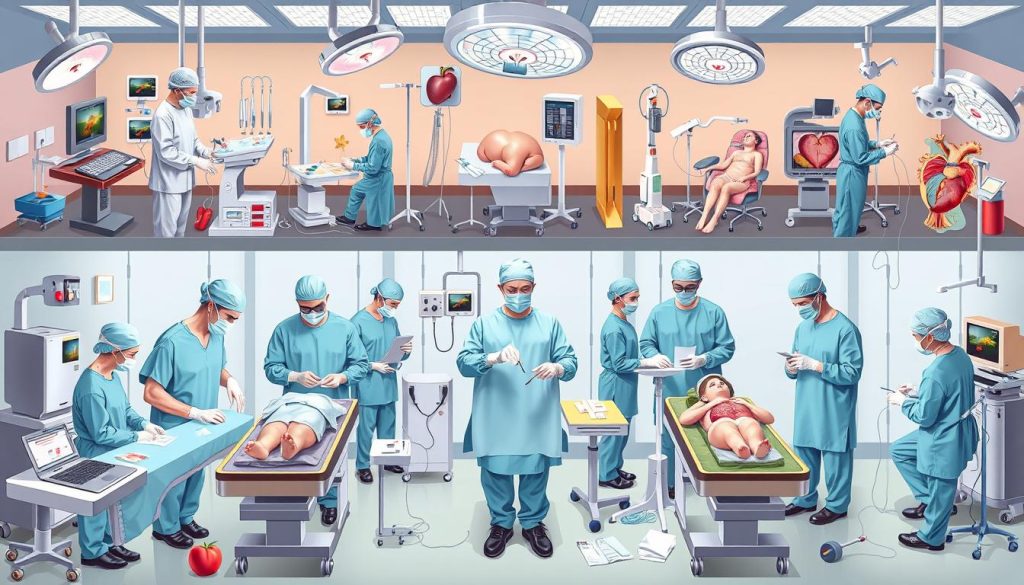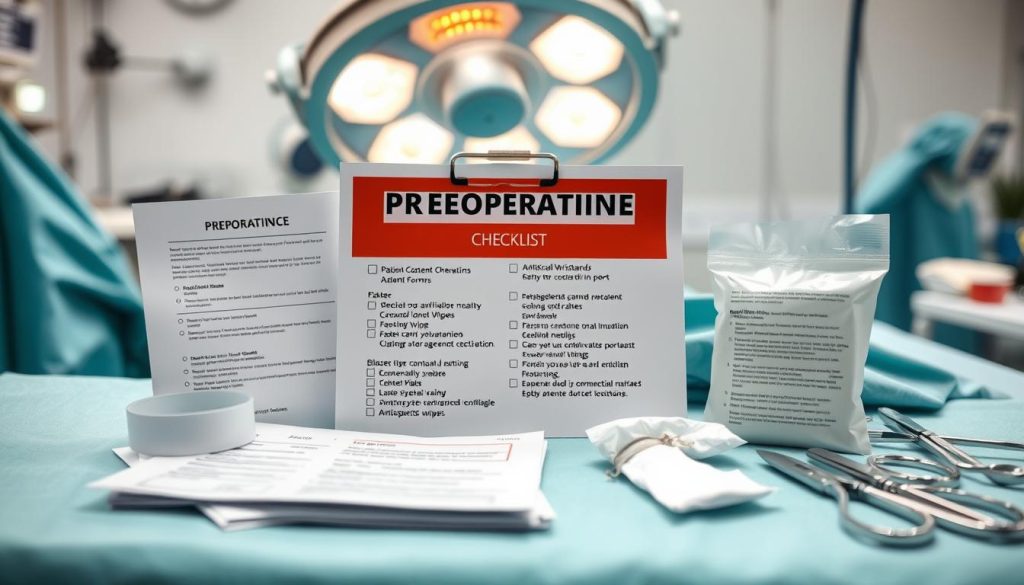Surgery is a medical field that uses special techniques to fix health problems. It includes many procedures to improve a person’s health and life quality. These operations involve making cuts in the body to fix or replace damaged parts.
In today’s medicine, surgery is key for diagnosing and treating many conditions. From simple procedures to complex surgeries, it has grown a lot. Knowing about surgery helps patients choose the best healthcare options.
Thanks to medical progress, surgeries are now more precise and less invasive. This has led to better results, shorter recovery times, and fewer risks for patients. Surgery keeps up with new technologies and methods, always improving.
Understanding Surgery Definition and Basic Concepts
Surgery is a medical field that involves working directly on body tissues. It includes procedures to diagnose, treat, or prevent diseases. These surgeries can be simple or very complex, needing hospital care.

Medical Intervention Through Surgical Procedures
Surgical procedures are key in medicine. They help remove bad tissue, fix injuries, or boost body functions. Examples include removing appendixes, heart bypasses, and replacing joints. Each surgery needs special skills and tools.
Historical Evolution of Surgery
Surgery has been around for thousands of years. In the past, surgeons worked without painkillers or clean environments. The 19th century brought big changes with anesthesia and cleaning methods.
Now, we have robots and new ways to do surgery. These advancements have changed how we operate today.
Key Components of Surgical Practice
Modern surgery includes several important parts:
- Preoperative assessment
- Anesthesia administration
- Sterile technique
- Precise tissue manipulation
- Postoperative care
These steps help keep patients safe and ensure good results. Surgeons get a lot of training. They learn new techniques and technologies to improve care.
Common Types of Surgical Procedures
Surgical procedures are many and varied, aimed at treating different health issues. They range from emergency surgeries to cosmetic ones. These operations are key in today’s healthcare.

Cardiac surgery deals with the heart and blood vessels. A common heart surgery is CABG, which boosts blood flow to the heart. Orthopedic surgeries fix bone and joint problems, like hip and knee replacements.
Neurosurgery is about brain and nervous system operations. It includes removing tumors and fixing aneurysms. General surgery covers a wide range, like removing appendixes and fixing hernias.
| Specialty | Common Procedures | Purpose |
|---|---|---|
| Cardiac | CABG, Valve Repair | Improve heart function |
| Orthopedic | Joint Replacement, Fracture Repair | Restore mobility |
| Neurosurgery | Tumor Removal, Aneurysm Repair | Treat brain disorders |
| General | Appendectomy, Hernia Repair | Address common ailments |
New surgical methods have led to less invasive surgeries. These surgeries heal faster and have fewer risks than old methods.
“The evolution of surgical procedures has dramatically improved patient outcomes and quality of life.”
Knowing about different surgeries helps patients choose better healthcare options. It’s vital to talk to doctors to find the right surgery for each person.
Distinguishing Between Open and Minimally Invasive Surgery
Surgical techniques have changed a lot over time. Now, patients have more choices for treatment. Open surgery and minimally invasive surgery are two main options. Knowing the differences helps patients choose the best care for themselves.
Traditional Open Surgery Techniques
Open surgery means making a big cut to get to the treatment area. This way, surgeons can see and work on organs and tissues directly. It’s needed for complex cases or when a detailed look is required.
Benefits of Minimally Invasive Approaches
Minimally invasive surgery uses small cuts and special tools. It has many benefits:
- Less pain and scarring
- Shorter hospital stays
- Quicker recovery times
- Lower risk of infection

Technological Advancements in Surgical Methods
New tech has made minimally invasive surgery even better. Robotic-assisted surgeries offer more precision and control. Endoscopic methods use tiny cameras and tools for surgeries through natural openings.
| Aspect | Open Surgery | Minimally Invasive Surgery |
|---|---|---|
| Incision Size | Large (6-12 inches) | Small (0.5-1.5 inches) |
| Recovery Time | Weeks to months | Days to weeks |
| Pain Level | Higher | Lower |
| Scarring | More visible | Less visible |
Even though open surgery is sometimes needed, minimally invasive surgery is becoming more popular. This is because of its many benefits and the ongoing tech improvements.
Emergency vs. Elective Surgery: Key Differences
Surgical procedures are divided into two main types: emergency and elective. It’s important for both patients and healthcare providers to understand these differences.

Emergency surgery is done when a patient’s life or health is at risk. These surgeries are unplanned and done as fast as possible. Examples include surgeries for severe trauma, acute appendicitis, or life-threatening internal bleeding.
Elective surgery, on the other hand, is planned and not urgent but improves a patient’s life quality. These surgeries are scheduled ahead of time, allowing for detailed preparation. Common examples include hip replacements, cataract removal, and cosmetic procedures.
| Aspect | Emergency Surgery | Elective Surgery |
|---|---|---|
| Timing | Immediate | Scheduled in advance |
| Preparation | Limited or none | Extensive |
| Risk Assessment | Quick evaluation | Thorough assessment |
| Patient Condition | Often critical | Typically stable |
| Decision Making | Rapid, by medical team | Collaborative, patient involved |
The way decisions are made for each surgery type is very different. In emergencies, doctors must act quickly with little information. For elective surgeries, patients can talk with doctors, consider risks and benefits, and make choices about their care.
“The distinction between emergency and elective surgery impacts every aspect of patient care, from preparation to recovery.”
Every surgery, whether emergency or elective, has risks and needs careful thought. Patients should talk with their healthcare providers to make sure they get the best care.
Essential Preoperative Preparation Steps
Getting ready for surgery is a big deal. It’s all about making sure the procedure goes well and safely. Let’s look at the important steps to prepare for surgery.
Medical Evaluation Requirements
Before surgery, you’ll get checked out thoroughly. This might include blood tests, imaging, and physical exams. Your doctor will also look at your medical history and current meds to spot any risks.

Lifestyle Adjustments Before Surgery
Changing your lifestyle is often needed before surgery. Your surgeon might tell you to:
- Quit smoking to help your body heal
- Eat right to support your recovery
- Stop certain meds that could mess with surgery
- Get more active to boost your health
Documentation and Consent Process
The last step is filling out paperwork. You’ll need to:
- Sign consent forms after talking about risks and benefits
- Give your insurance info
- Fill out medical questionnaires
- Get written instructions for the surgery day
By following these steps, you help make your surgery a success. Remember, good preparation means better results and an easier recovery.
Understanding Surgical Team Roles and Responsibilities
Surgical procedures need a team of skilled professionals. They work together to keep patients safe and ensure good results. Each team member is vital, no matter the surgery’s complexity.
The surgeon is in charge, doing the operation and making key decisions. They count on the anesthesiologist to keep the patient comfortable and stable. The anesthesiologist administers and watches over the anesthesia.
Surgical nurses are key, helping the surgeon and managing tools and supplies. They also keep the area clean and watch the patient’s health during surgery.
- Scrub nurses: Prepare and handle surgical instruments
- Circulating nurses: Manage the operating room and assist other team members
- Surgical technologists: Set up equipment and assist with instrument handling
Other roles are vital too. Radiologists help with imaging, and pathologists analyze tissue samples. Surgical assistants help the main surgeon in complex cases.
“Effective communication and teamwork are the cornerstones of successful surgical outcomes.”
The team’s teamwork ensures patients get the best care. Each member’s skills are important for the surgery’s success. This shows how teamwork is key in surgery today.
Anesthesia Types and Their Applications
Understanding anesthesia is key when you’re getting ready for surgery. It makes sure you’re comfortable and safe during the operation. Let’s look at the main types of anesthesia used today.
General Anesthesia Procedures
General anesthesia makes you unconscious for big surgeries. It’s given through gases you breathe in or drugs you get through an IV. Doctors watch your vital signs and how deep you’re sleeping during the surgery.
Local and Regional Anesthetic Options
For smaller surgeries, doctors might use local or regional anesthesia. Local anesthesia numbs a small area. Regional anesthesia blocks pain in a bigger area. These options let you stay awake, which can help you recover faster.
Sedation Levels and Monitoring
Sedation levels vary, from light to deep. The choice depends on the surgery and what you need. Doctors keep an eye on how sedated you are and adjust as needed.
| Anesthesia Type | Use Case | Patient State |
|---|---|---|
| General | Major surgeries | Unconscious |
| Local | Minor procedures | Awake, specific area numb |
| Regional | Limb or body area surgeries | Awake, larger area numb |
| Sedation | Varies by procedure | Relaxed to semi-conscious |
The right anesthesia depends on the surgery, your health, and how fast you’ll recover. Talking to your doctor about anesthesia options helps pick the best one for you.
Common Surgical Risks and Complications
It’s important for patients to know about surgical risks before surgery. Modern medicine has made surgeries safer. But, complications can happen. Knowing about these risks helps patients make better choices about their care.
Infections are a big risk in surgery. Even with strict cleaning, bacteria can sometimes get in. Bleeding is also a worry, more so in complex surgeries. Doctors work hard to prevent blood loss, but sometimes it can happen.
Reactions to anesthesia are another risk. These can be mild, like nausea, or severe, like an allergic reaction. Anesthesiologists watch patients closely during surgery to catch any problems early.
| Surgical Risk | Frequency | Prevention Measures |
|---|---|---|
| Infection | 1-3% of surgeries | Sterile techniques, antibiotics |
| Bleeding | Varies by procedure | Careful surgical technique, blood thinners management |
| Anesthesia reactions | 1 in 10,000 to 1 in 200,000 | Pre-surgery screening, monitoring during procedure |
Less common but serious problems include blood clots and organ damage. These risks depend on the surgery type and the patient’s health. Doctors talk about these risks with patients before surgery, stressing the need for informed consent.
Following post-operative instructions is key to avoiding risks. Patients help their recovery by following their doctor’s advice on wound care, medication, and activity levels.
Post-Operative Care and Recovery Guidelines
After surgery, taking good care is key for a smooth recovery. Knowing what to do helps patients heal better.
Immediate Post-Surgery Care
Right after surgery, patients need close watch. Managing pain is important, using meds and ice packs. Keeping the wound clean and dry is also vital.
Long-term Recovery Considerations
As healing goes on, new challenges come up. Some surgeries mean eating certain foods only. Avoiding too much activity helps healing tissues.
Regular check-ups with doctors are important. They help track progress and adjust care plans.
Physical Therapy and Rehabilitation
Many surgeries need physical therapy for the best results. Therapists create plans to improve function and strength. Rehab can start soon after surgery and last for months.
| Recovery Phase | Activities | Duration |
|---|---|---|
| Immediate | Rest, pain management, wound care | 1-3 days |
| Short-term | Limited movement, follow-up visits | 1-4 weeks |
| Long-term | Physical therapy, gradual return to activities | 1-6 months |
Every patient’s recovery is different. Following your doctor’s advice is the best way to get the best results from surgery.
Modern Surgical Technologies and Innovations
The field of surgery is changing fast with new technologies. These advancements are making many surgeries better, like minimally invasive ones. Surgeons now use advanced tools to help patients heal faster and with less pain.
Robotic-assisted surgery is a big step forward. It lets surgeons do complex tasks with more accuracy. This is great for minimally invasive surgery, where making small cuts is important.
3D-printed surgical implants are another big improvement. These implants are made just for each patient, leading to better results. They’re used in many surgeries, from fixing bones to rebuilding faces.
Augmented reality (AR) is changing how surgeons plan operations. They can see detailed images of the body before starting. This helps them be more precise and lowers the risk of complications.
| Technology | Benefits | Applications |
|---|---|---|
| Robotic-assisted surgery | Enhanced precision, smaller incisions | Cardiac, gynecological, urological surgeries |
| 3D-printed implants | Custom fit, improved outcomes | Orthopedic, craniofacial surgeries |
| Augmented reality | Better planning, reduced risks | Neurosurgery, complex tumor removals |
These new tools come with challenges. They can be expensive and require special training. But as technology gets better, these tools will become more common. This means a future where surgery is more advanced and effective.
Cost Considerations and Insurance Coverage
It’s important to know the costs of surgery. This includes what insurance covers and what you might have to pay yourself. Knowing this helps you plan for your medical needs.
Understanding Medical Insurance for Surgery
Most medical insurance covers many surgeries. But, how much it covers depends on the type of surgery. Emergency surgeries usually have more coverage. Elective surgeries might need approval or have limits.
Out-of-Pocket Expenses
Even with insurance, you might have to pay some costs. These can include:
- Deductibles: The amount you pay before insurance kicks in
- Copayments: Fixed amounts for specific services
- Coinsurance: A percentage of costs you share with your insurer
Financial Planning for Surgical Procedures
It’s key to plan for the financial side of surgery. First, figure out your total costs. This includes the surgery and any extra expenses like meds or therapy. Many hospitals have cost calculators to help you plan.
If costs seem too high, look into payment plans or financial help. Some hospitals offer discounts for early payment or work with medical credit companies.
“Always review your insurance policy and speak with your provider to understand your coverage before undergoing any surgical procedures.”
Understanding these financial aspects helps you deal with surgery costs better. This way, you can focus more on your health and recovery.
Choosing the Right Surgical Facility and Surgeon
Finding the best place for surgery and the right surgeon is key for good results. When looking at different surgeries, there are important things to think about.
Experience is very important. Find surgeons who focus on your surgery type. Look at their qualifications, certifications, and what others say about them. Their past work can show how skilled they are.
The quality of the hospital is also critical. Look at how well the hospital does in your surgery. Some hospitals are better at certain surgeries than others.
- Check surgeon’s experience and specialization
- Review hospital quality ratings
- Investigate success rates for specific surgeries
- Seek second opinions
- Consider location and post-operative care
Getting a second opinion is a good idea. Different doctors might have different ways to treat your problem. This can help you choose the best option for you.
| Factor | Importance |
|---|---|
| Surgeon’s Experience | High |
| Hospital Quality | High |
| Specialization | Medium to High |
| Patient Reviews | Medium |
| Location | Low to Medium |
Choosing wisely can greatly affect your surgery’s success and recovery. Spend time researching and talking to doctors to get the best care for your surgery.
Patient Rights and Informed Consent in Surgery
Knowing your rights and understanding informed consent is key when thinking about surgery. Every patient should get clear, detailed info about their surgery. This includes the risks and benefits. This openness is a big part of what surgery is all about and helps patients make smart choices.
The informed consent process means doctors explain the surgery, why it’s needed, and other options. Patients can ask questions and talk about worries before making a decision. This talk helps deal with possible risks and makes sure patients are part of their care team.
Patient rights go beyond just informed consent. People have the right to privacy, see their medical records, and say no to treatment. These rights help patients and doctors work together better. By knowing their rights, patients can make choices that fit their values and goals.
In the end, patient rights and informed consent are at the heart of fair medical care. They protect patients’ freedom and build trust between them and their doctors. As surgery gets more advanced, keeping these values is key for care that puts patients first.
FAQ
Q: What is the definition of surgery?
A: Surgery is a medical procedure that involves cutting into a patient’s body. It’s done to diagnose, treat, or repair health conditions. Trained medical professionals perform it in a clean environment using special tools.
Q: What are the main types of surgery?
A: There are several types of surgery. These include open surgery, minimally invasive surgery, elective surgery, and emergency surgery. Each type is chosen based on the patient’s condition and needs.
Q: What is the difference between open surgery and minimally invasive surgery?
A: Open surgery requires a big cut to access the area. Minimally invasive surgery uses small cuts and tools, often with camera guidance. Minimally invasive surgery usually means less pain, quicker recovery, and less scarring.
Q: What is elective surgery?
A: Elective surgery is planned and not urgent. It’s done to improve life quality or fix non-life-threatening issues. Examples are knee replacements, cataract surgery, or cosmetic procedures.
Q: What are the common risks associated with surgery?
A: Risks include infection, bleeding, and reactions to anesthesia. Blood clots and organ damage are also possible. Risks depend on the surgery type, patient health, and other factors. Always talk about risks with your doctor before surgery.
Q: How should I prepare for surgery?
A: Preparing for surgery means a medical check-up and adjusting medications. You’ll need to fast before the procedure and follow your team’s instructions. Lifestyle changes, like quitting smoking, might also be needed.
Q: What is the role of anesthesia in surgery?
A: Anesthesia prevents pain during surgery. There are different types, like general anesthesia, which makes you unconscious. Others numb specific areas or small spots.
Q: How long does it take to recover from surgery?
A: Recovery time varies by surgery type and individual health. It can be a few days for simple procedures or weeks or months for complex ones. Your doctor will guide you through the recovery process.
Q: What is robotic-assisted surgery?
A: Robotic-assisted surgery uses advanced robotic systems for precise control. It’s a minimally invasive method that can lead to better results and faster healing.
Q: How do I choose the right surgeon for my procedure?
A: Look for a surgeon with experience and the right credentials. Check their patient outcomes and read reviews. It’s also key to choose someone you feel comfortable talking to.


















